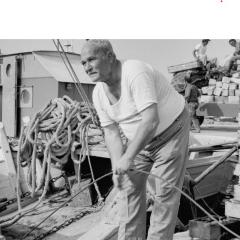They say you shouldn’t leave home until you have seen your own country, which rings true for six journalism students from The University of Queensland who recently returned from the South Burnett region where they reported on and shared stories from the community as part of a new study tour.
This project was initiated within UQ’s School of Communication and Arts to reach out to rural communities beyond Brisbane and address the fact that news deserts have been emerging globally for some time.
UQ Research Fellow Richard Murray led the trip, and said news deserts are a particularly troubling phenomenon where communities lose their local news and, generally speaking, don't get them back.
“This project is a win-win. It enables communities to grow and have their stories told via a UQ platform called JACdigital as well as offer our students a great learning opportunity,” Mr Murray said.
As part of JOUR3122 Journalism Field Study the students based themselves in Wondai, a small agricultural services town approximately four hours’ drive from Brisbane.
“We all recognise the importance of regional stories, especially given the current drought and extreme weather conditions and the slow withdraw of government services,” Mr Murray said.
“A lot of journalists start their career in a regional area, so this unique experience means UQ students are on the front foot and have an advantage later on.”
Head of UQ’s School of Communication and Arts Professor Bronwyn Lea said this innovative course sees high-achieving journalism students practice on-location reporting under real-world conditions.
“It's really important for us in the School that our students get a well-rounded education and be prepared for the ever-changing media environment,” Professor Lea said.
Thanks to JACdigital, the students are able to showcase their work in a number of different forms – video, audio, podcasts and digital print–as well as reach a large and diverse audience with the possibility of being picked up by other media outlets.
Professor Lea said programs like this create positive change by bridging the divide between regional and urban communities.
“I am very pleased with the program’s new focus on regional Australia. It will add a lot to these students’ formation as the new generation of journalists,” she said.
Edward Roker participated in the trip and said as more journalists are going to be getting work in regional and rural areas rather than overseas, it's better to be learning on your home turf.
“Mental health is something that has affected me in my life, so I'm really passionate to cover stories like that and make a difference where I can by raising awareness and getting people to speak up about the subject,” he said.
For Chelsea Clark this experience was well outside her comfort zone, having been born and raised city-side.
“It was so good for me to do something a little bit different – talking to locals and getting some of the more gutsy stories from the outback,” she said.
Professor Lea said the plan for subsequent field-trips is to create stand-alone reporting platforms that let local residents create their own stories.
“As well as offering our students a distinctive learning opportunity, this approach will give local residents the skills they need to produce regional stories and a platform for publishing them long after our students have left,” she said.
Visit JACdigital to check out stories from Edward, Chelsea and other journalism students who took part in this field trip.
If you are interested in taking part in our next field-trip to the South Burnett, please contact Richard Murray at r.murray1@uq.edu.au
Media contact: Richard Murray r.murray1@uq.edu.au



